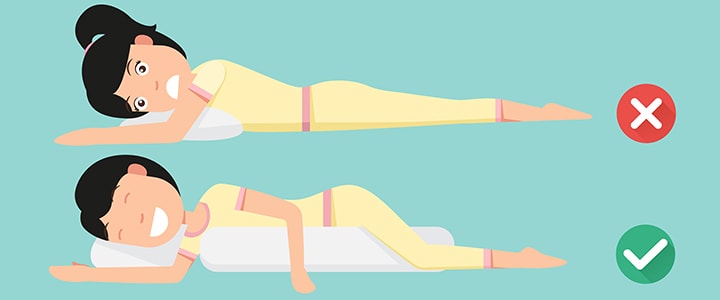The Link between Sleeping Posture and Pain

You may already know that the quality of your sleep affects your overall health and wellness. For instance, regularly getting a "good night's sleep" can help you reduce stress, strengthen your immune system, improve your memory, balance your emotional and mental health, and even help you shed excess pounds!
However, you may not realize that there's a relationship between sleeping posture and pain. That's because, when your sleeping posture isn't properly aligned with the three natural curves of your body (located in your lower back, middle of your back, and near your neck), then excess stress and strain is applied to your spine, shoulders, hips, neck and jaw. Over time, this "wear and tear" takes its toll, causes an injury, and manifests as pain.
Tips to Improve Your Sleeping Posture
Before we look at some specific sleeping techniques to help significantly reduce -- and possibly completely eliminate – your back and neck pain, here's some general advice that can give your body some long overdue "R&R" when your head hits the pillow:
-
Invest in a good quality mattress.
Do your research and choose a suitable firm mattress that is appropriate for your body type. Quality mattress stores (or departments) will be happy to let you lie down for a good half an hour, so that you can take different models for a "test drive." Also remember that your body changes as you age, and so the mattress you bought 5 or 10 years ago may not be the right one today. -
Avoid sleeping on your stomach.
Sleeping on your stomach may seem comfortable – and may even temporarily relieve your lower back pain -- but it's extremely bad for your back, neck and shoulders. That's because it restricts the movement of your upper body, which should be allowed to move freely while you sleep. Sleeping on your stomach also provides no support at all for your back, and as noted above, puts a great deal of stress and strain on your spine. -
Try not to twist your body.
Twisting and turning during sleep deprives your body of the support it needs, plus it can lead to strained muscles. Also, keep in mind that sometimes your body will twist and turn itself (i.e. without your conscious effort), because it's either trying to avoid pain, or because it's overcompensating for imbalances or injuries. -
Use a good pillow to keep your spine straight.
If you experience neck pain, try sleeping on your side and use a good pillow that keeps your spine straight. If you experience neck pain, try sleeping on your side and use a pillow between your legs (if you prefer to sleep on your back, place a pillow behind your knees).
Rehab Programs to Improve Sleeping Posture
While the tips above can certainly help reduce pain and prevent an injury (or prevent further damage to an existing injury), most people with back or neck pain will need a Rehab Program that targets and remedies the underlying causes of their pain -- which often includes poor sleeping posture. And while each Rehab Program must be customized for each individual, it should include 4 components:
- 1. A cardiovascular component to help build towards improved fitness.
- A general stretching component to regain flexibility and restore balance to muscles in the body, and especially the injured area.
- A muscle balancing component, to ensure that muscles are firing effectively and in sequence.
- A strength component, that must be followed regularly 3-4 times/week for 6-8 weeks, and then 2-3 times/week thereafter.
Getting the Answers and Help You Need
At the Advanced Therapeutic Centre, we've helped numerous people of all ages dramatically improve their sleeping posture. We've also provided them with essential education on how to sleep -- and, just as importantly, how not to sleep – so they can enjoy the many benefits of a good night's sleep, and of course, experience freedom from discomfort and pain!
To learn more or book your 30 minute consultation, call us at (416) 361-9900 during our Centre hours (Monday, Wednesday & Friday from 8:00 AM - 6:00 PM).
